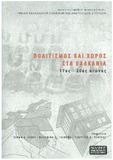| dc.contributor.author | Katsaros, Vasilis | |
| dc.date.accessioned | 2016-05-25T12:22:12Z | |
| dc.date.available | 2016-05-25T12:22:12Z | |
| dc.date.issued | 2015 | |
| dc.identifier.uri | http://hdl.handle.net/11728/7762 | |
| dc.description | Ιπ the spiritual environment that heralds the dawn of the Greek Enlightenment integrates the movement of scholars of this time struggling to show the Interest ίπ the cultural achievements of the Greeks ίπ an attempt to
awake the hypnotizing consciousness of their enslaved descendants. Next to ''Archaeology'' (i.e. the knowledge of the culture of the ancient Greeks and their mythology) the wider history is of particular importance and constitutes
along with the Geography, Mathematics, Rhetoric and Philosophy ίπ the main core of the educational system of the "circular education of Greek chίldren". Spiritual activity has widened the ideological conceptions ίπ the approach of major historical works of the period, which had to be translated into New Greek ίπ order to enrich their readers' world of knowledge. This "translation" stream is manifested early and presented ίπ its prime just before the start of
the spiritual phenomenon of the Enlightenment, which is extended, as it is known from the last quarter of the 18th century υρ until the Greek revolution. The interest ίπ the history of literature, science and culture generally lies
ίπ the ideological orientations of the creators of these movements, among which is included part of the movement towards the study of Byzantine history Is, a culture that was so much meant to be slandered during the Enlightenment
period. Ιπ this paper an attempt to highlight the important role of this project for the promotion of the Byzantine period of the history and culture of Byzantium. | en_UK |
| dc.description.abstract | Ο 18ος αιώνας μπορεί να χαρακτηριστεί γενικά ως «δεύτερος Ουμανισμός» του τουρκοκρατούμενου Ελληνισμού (Γεδεών 1976; 1-113, Πα'ίζη - Αποστολοπούλου 2007) μετά την «πρώτη Αναγέννηση» των γραμμάτων (Πολίτης 1989; 49-60) και της θρησκευτικής τέχνης του 160υ αιώνα (Χατζηδάκης
1975α; 410-437, Garidis 1989, Πάλλας 2007; 264-283), μια εποχή που αναζήτησε τις ζωντανές παραδόσεις του Βυζαντίου στους παραπάνω τομείς και στην εκπαίδευση αλλά και στην κοινωνική συσπείρωση των Ορθοδόξων Ελλήνων και τα συλλογικά τους οράματα για το μέλλον του Ελληνισμού (Δημαράς 1947; 196-203, Mango 1960; 59-93, Καριώτογλου 1982, Κυριακού 1995; 171, Magdalino 2000; 23-31, Hatzopoulos 2005, Hatzopoulos 2011; 95-116), | en_UK |
| dc.language.iso | el_GR | en_UK |
| dc.publisher | Εκδόσεις Πανεπιστημίου Μακεδονίας | en_UK |
| dc.rights.uri | http://creativecommons.org/licenses/by-nc-nd/4.0/ | en_UK |
| dc.subject | Βυζάντιο | en_UK |
| dc.subject | 18ος αιώνας | en_UK |
| dc.subject | δεύτερος Ουμανισμός | en_UK |
| dc.title | Η επιβίωση των ιδεών του Βυζαντίου στην πνευματική ζωή του 18ου αιώνα | en_UK |
| dc.title.alternative | Πολιτισμός και χώρος στα Βαλκάνια 17ος-20ός αιώνας | en_UK |
| dc.type | Working Paper | en_UK |


